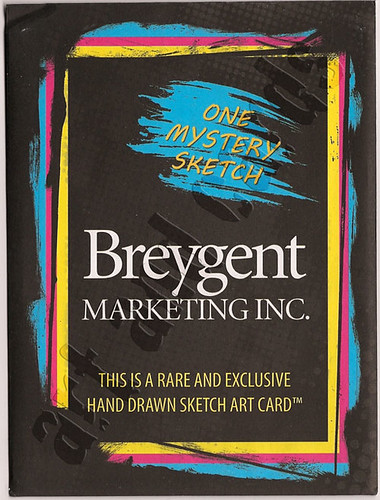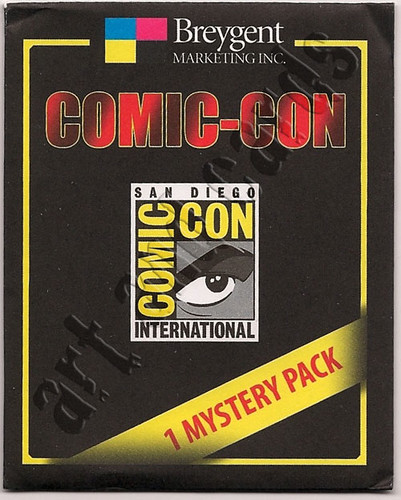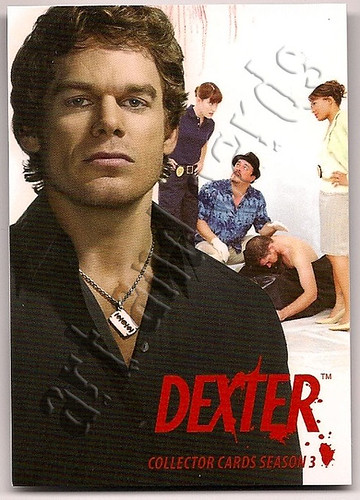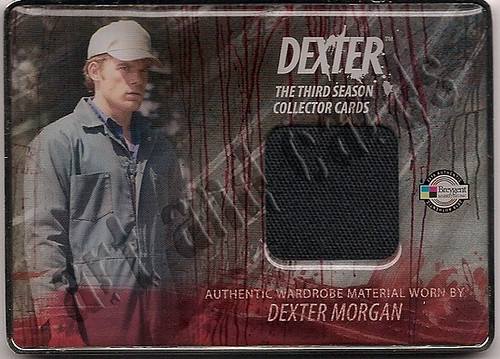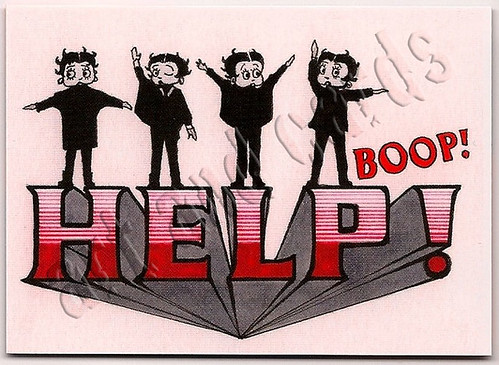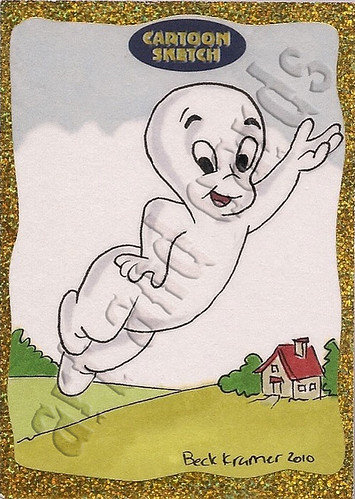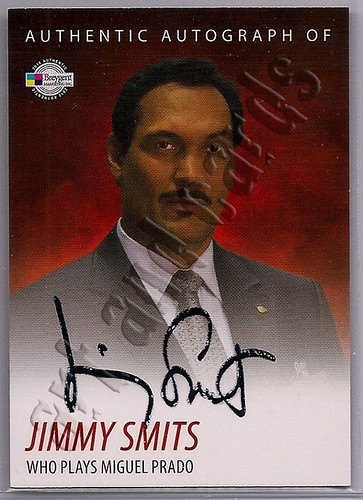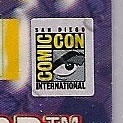While I definitely want to touch on this topic, I think I should spend a few moments on the practice of "ripping and flipping," a phrase I only learned recently. "Ripping and flipping" refers to the practice of opening lots and lots of product and then turning around and selling the individual cards, preferably for a premium over what was paid for the original product. It's comparable to buying an old house, fixing it up and then selling it for more than you paid. And any search on e-Bay for non-sport cards (and sport cards, I'm sure) issued in the past few years or so will give evidence that this is done a lot. Frankly, I have to admit I sort of did this last summer when I opened a lot of Harry Potter and the Half-Blood Prince and Dexter boxes before selling them all off a month or so later, but the difference there was that I was raising funds to attend Mid-Ohio Con. And now I regret getting rid of those cards.
After that convention, my interest in non-sport cards increased and since then I have opened quite a bit of different products. I need to digress a bit to say, when I was a kid, I collected lots of different cards (all of which I unfortunately don't have any more) from Pac-Man to Star Wars. But back then (late '70s, early 80s) there were not many (if any) incentives to purchase these cards other than for the sake of collecting the base sets. And it was a lot of fun to meet with friends so I could get rid of my doubles in exchange for the cards I didn't have. Of course, there was no Internet then, either, so I relied on this group of friends for filling out sets.
However, it seems the non-sport products have moved well beyond focusing on base sets. Now it's as if a set must almost guarantee autographs, sketch cards, costume and prop cards, and other incentives to drum up interest. I have no doubt this is why many, many collectors are buying these products - for the premiums. I'd be lying if I said that wasn't mostly true for me. I really dig autos, but I love costumes/props and sketches more than the base cards. And while many companies are doing this, a few are doing it much better than others.
Ripping and Flipping
Because the premium inserts are what collectors seem to be going after the most and certain inserts are in greater quantity than others, dealers and collectors alike learned they could open a lot of product, pluck out the best inserts, resell them on e-Bay and make a higher profit than what they would have made had they simply sold the product unopened.
When I got into the hobby in 2009, it didn't take me long to see how this was working. Again, search e-Bay, and you'll see what I'm talking about. But I get it. I do. There are, however, a couple of reasons I have a problem with it.
- It takes some of the fun out of collecting. I like the gamble of opening a product not knowing what I'm going to get. Say that I know there is a chance, however small, that in the Harry Potter and the Half-Blood Prince product I can get a card autographed by Harry himself, Daniel Radcliffe. If I really, really want that card, I can definitely find one on e-Bay, but I better be prepared to pay top dollar, sometimes almost as much as a whole case. If that's the only card I want out of the set, then paying that price for it may not be a problem. For me, though, I have enough interest in the other premium inserts that I'd rather buy multiple boxes with the probability of getting a couple of autographs, costumes and props, and a base set, than throwing all my money into a single card. And the gamble might pay off with pulling a top auto myself, though that chance is diminished because some of those cards have already been pulled and immediately placed on e-Bay. By "ripping and flipping," these folks are reducing my chances thus reducing some of my fun.
- It reduces the amount of unopened product available for me to purchase. Yes, I know, there are usually more than enough dealers selling more than enough product for everyone interested. The manufacturer may sell out, but you can normally find someone with some of it for sale. Sometimes, though, the product is so limited that no unopened product is available. An example of this phenomenon is 5finity. This company began selling packs with at least one sketch card per pack guaranteed. It contained no base cards, just the sketch. For those of us who like sketch cards, this was great, especially because packs were priced far below the cost of what a box of cards runs. When they were released, 5finity's packs for The Pro were nearly impossible to find (luckily, I had preordered a few packs from a dealer), but not a week later, a large number of the sketches found their way onto e-Bay, mostly priced above the pack price and often priced much, much higher. As of today (August 11, 2010), there are more than 150 listings for The Pro sketch cards, out of an original run of just 800 packs. Instead of sitting on all of these sketches that they may never sell or may sit on for a long time, these folks could have made money by selling me and others some of the packs unopened for suggested retail.
- It helps fill out hard to complete insert sets. When I was a kid, I often could get the cards I needed from friends. Nowadays, most of my friends don't collect, so I have to seek out other opportunities for securing the cards I need/want. The Internet has been a great help in this. The Non-Sport Update Magazine's forum Card Talk offers a trading area where non-sport collectors can seek out others to help fill holes in a set. I recently used it for the first time with fabulous success. And of course, folks who are "ripping and flipping" to sell on e-Bay are providing a service. Say I need a particular prop card to complete my master set or I just think it is so cool that I want it for my collection. Thanks to card company information or other collectors, I know there were only 200 made of this particular card. If the product is limited to 3000 boxes (300 10-box cases), I don't have a great chance of getting that card simply by purchasing unopened product. However, Non-Sport Dealer pulled one (thanks to him/her opening multiple cases) and has put it on e-Bay. If I really, really want it, I might be willing to pay the price he/she is asking, and thus able to complete my set.
- If you're just a base set collector, there's no cheaper way to collect. When folks "rip and flip" boxes/cases of cards for the premiums, they are left with the excess base cards. Depending on the size of the base set, you often can get around 2 base sets from a box. Say a base set is 60 cards. If there are 24 packs per box with 7 cards per pack, a box will roughly yield about 140 base cards. If a case has 10 boxes (some companies provide 12 per case, some provide only 8), the yield will be about 1,400 cards which could feasibly produce 23 base sets. If a dealer opens more than one case, well... you see what I'm getting at - tons of base sets. Since they are "ripping and flipping" to make profit off the premium card, they can offer those base sets for bargain-basement prices. I have seen many a set for less than $5 each. If that's all you, as the collector, want, then there is really no cheaper way to get it. Much better than buying a box for $60 just to get a set of 60 cards.
Packs vs. Boxes
The first pack I recall that guaranteed a premium card was Razor's Ink autograph line. When Inkworks folded, Razor scooped up much of their inventory of leftover autographed cards from their many television and movie product lines. Razor then packaged many of these autographed in sturdy card holders, with one per pack and 5 packs per box. That's it. By buying a box, you were guaranteed 5 authentic autographed cards, and at around $80 a box, that put the purchase price per auto at $16 each. Not bad for a guaranteed autographed card, especially if you are an autograph collector. However, Razor glutted the market with two more subsequent products that included autographs and now many (most?) of these autos do not sell for that original $16 price. Of course, that a different story for another day.
As mentioned, 5finity helped get the sketch pack concept rolling. By buying a sketch pack, a collector is guaranteed one sketch card, typically ranging in price from $20-$30 retail. There are no other cards. None. And you aren't paying for bunches of extra cards, like you would by purchasing a box of say, Marvel 70th from Rittenhouse. (I dug these cards, by the way. This is not a knock on Rittenhouse.) From that box or multiple boxes, you would have lots and lots of base cards, maybe a complete set of the 1 or 2 insert sets and a sketch from each box, which you paid $50-$70 per box.
Other companies have gotten into the sketch-per pack game (Sadlittles and Breygent, to name a couple), but it is Breygent who is taking it a step further and becoming a game-changer in the world of non-sport trading cards, all the while creating some interesting conversation within the non-sport community. As mentioned above, there is a thread devoted to the topic on the Non-Sport Update forum CardTalk, and trading card blogger Ryan Cracknell (aka @tradercracks on Twitter) posted about this very topic a few days ago.
Earlier this year, Breygent entered the sketch-pack fold with two sets: Golden Age of Comics and Cartoon Sketch. Each pack, available around the $20-$30 price-point, guaranteed one sketch card. But what Breygent did that 5finity did not was provide a little extra. Each pack of both sets included one promo card for the set. The Cartoon Sketch packs included a "metallogloss" card, a thick card with a glossy coating. The card itself is a reproduction of one of the sketch cards found in the set. There were 13 "metallogloss" cards and 9 different promos to collect. The Golden Age of Comics packs included a regular base card instead of a "metallogloss" card, but it, too, was a reproduction of a sketch card in the set. This base set was made up of 40 cards.
So, what we are seeing here (besides the fact that you receive a premium card in every pack) is that in order to make a base set, a collector must do one of three things:
- buy at least 40 packs
- buy a smaller number of packs and trade for the handful of base cards needed to complete the set
- buy a couple of packs and try to find a complete base set on e-Bay (or some other site)
Breygent also isn't settling for just sketch cards as premiums. They have announced two future sets that will include other premiums like autographs, costumes/props and film cells. Now available is a pack-only product based on the film Paranormal Activity. Each pack will contain 9 cards:
- 2 autograph, costume or film cell cards
- 5 base cards (from a set of 50)
- 1 Portents of Evil chase card (set of 9)
- 1 David Desbois Puzzle card (set of 9)
Again, base sets are going to be difficult to come by (one of which is listed on e-Bay today for $22.50, much more than what base sets from box products go for). But doesn't that bring the trading back into trading cards?
I have to admit, I really love this concept. I don't need nor necessarily desire base sets. For some properties they interest me (Dexter, Harry Potter) and for some they don't (Batman Archives, Paranormal Activity). While I wouldn't buy a box of Paranormal Activity cards, I just might plunk down some change for a couple packs of them. Yet, while I will most definitely invest in multiple boxes of Dexter and Harry Potter, I certainly wouldn't be adverse to buying those in the pack format as well. And as a collector, I would be open to buying multiple packs of those.
It has been discussed that by going to pack-only product, manufacturers could save money in production costs by printing significantly fewer base cards (which also, some say, would be a greener way to go, as well). This money could be funneled back in to making the premium cards better somehow (surely the sky's the limit in that regard). But what does it really mean financially for the collector?
Let's take the latest product from Artbox Entertainment, Harry Potter: Heroes and Villains. On average, a box contains 2 premium hits (there are 19 per case) which could be autographs, costume cards (some dual costumes) or props. Also included in a box is 1 box topper card and each case includes one case topper card. In the past, the box and case toppers have been metal cards, widevision lenticular cards, wooden cards and crystal engraved cards. So, let's count the case topper as another premium card, since with only 3000 boxes produced there are only 300 cases (10 boxes per case) and thus only 300 case toppers divided by 3 different case toppers, so probably just 100 of each different one. That makes 20 premiums per case.
If I buy a case, I will spend between $500 and $600 (depending on the vendor), so let's say $550. Looking at just the premium cards I should receive from this box, I will pay around $27.50 per card. If I factor in say 1 base set per box at a value of $5 per set for $50 and two box topper sets at $10 per set for $20, then I will be paying $24 for each premium card.
This is about what I will pay for any of the pack-only products now available, and the Paranormal Activity product is giving me 2 hits per pack, which means I'm only paying about $12-$15 per premium card. It is apparent that these pack-only products have exceptional value without all the excess.
For the dealer, it provides exceptional value, too. One dealer posted on CardTalk that it would benefit him because with the lower price point he can have more volume.
Another issue being brought up is packaging. Often a prop card can be thicker/heavier than an autograph or costume card and thus unscrupulous folks can search through packs this way before selling if the packaging is just a simple envelope or normal pack wrap. Of course this is still a young development, so things could change, but I think that there could be some type of packaging like a small box not much larger than a normal pack that would not allow anyone the ability to gauge the thickness of the enclosed card(s) and handpick. That doesn't really solve the problem of weight differences, but maybe it would just come down to buying from a reputable dealer, which we all should be doing anyway. I believe packaging will be something we see change over time.
Now What?
So what does this all mean for the hobby? I think it means great, great things. It's just another innovative way to get the cards that collector's want into their hands while making base sets more collectible. I think it enhances the fun for the collector to know that when s/he opens that pack it will contain a premium card and it will cost him/her no more than or less than the same cards obtained through the purchase of boxes or cases. I also think it allows manufacturers to focus on the cards collectors really want and thus provide them with better quality premium cards.
In my mind, it's a win-win situation. And I like it.

